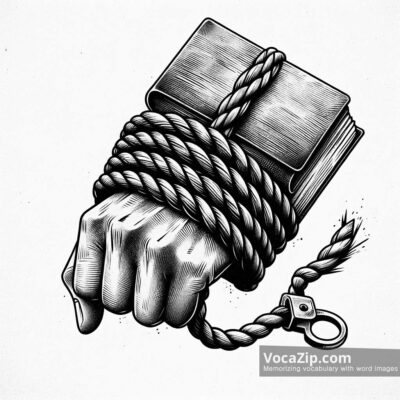bound meaning
bound :
to leap, to jump
Verb
▪ The dog bounded across the yard.
▪ The dog jumped across the yard.
▪ She bounded up the stairs.
▪ She leaped up the stairs.
paraphrasing
▪ leap – to jump high or far
▪ jump – to push off the ground and rise in the air

bound :
certain, destined
Adjective
▪ She is bound to succeed.
▪ She is certain to succeed.
▪ The event is bound to be fun.
▪ The event is sure to be fun.
paraphrasing
▪ destined – certain to happen
▪ certain – sure to happen
Pronunciation
bound [baʊnd]
The stress is on 'bound' and sounds like 'bownd'.
bound [baʊnd]
The stress is on 'bound' and sounds like 'bownd'.
Common phrases and grammar about bound
bound - Common meaning
Verb
to leap, to jump
Adjective
certain, destined
Part of Speech Changes for "bound"
▪ boundless (adjective) – without bounds
▪ boundary (noun) – a limit
Common Expressions with "bound"
▪ bound to succeed – certain to succeed
▪ bound for New York – heading to New York
▪ bound over the fence – jump over the fence
▪ bound the package – tie the package
Important examples of bound in TOEIC
Vocabulary examples from the TOEIC test
In TOEIC vocabulary questions, bound often refers to something that is certain to happen.
Example of a confusing word: bind (to tie or secure)
Grammar examples from the TOEIC test
In TOEIC grammar questions, bound can be used as both a verb and an adjective, often asking to identify the correct form.
bound
Idioms and fixed expressions in TOEIC
bound to fail
means 'certain to not succeed', used when discussing high risks.
bound by contract
means 'tied by an agreement', used in legal contexts.
Differences between similar words and bound
bound
,
leap
differences
Bound means to jump quickly, while leap often means to jump high.
bound
,
certain
differences
Bound means to be sure to happen, while certain can also mean sure without the action of jumping.
Words with the same origin as bound
The origin of bound
The word 'bound' comes from the Old English 'bund', meaning 'to tie or fasten'. It evolved to mean moving quickly or being certain.
Word structure
The composition of the word is unclear.
Words with the same origin
The root of bound is unclear or difficult to confirm.
Please select an image in the quiz
Previous post and next post







